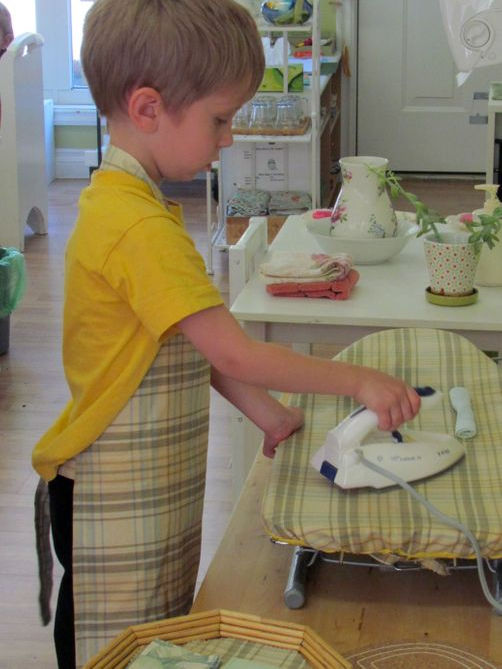CALL US: 905-478-4949
EMAIL: officeqma@rogers.com
OUR CHILDREN’S HOUSE MONTESSORI PROGRAM

Our Montessori program in Queensville includes a mixed age prepared environment serves children from 2.5/3 to 6 years of age. During this time of development, children readily absorb all aspects of their environment in a quest to become part of their culture. Children want to learn, they want to be independent and have an effortless ability to absorb knowledge from their surroundings.
The classroom environment is specially prepared with Montessori materials that are designed for the presentation and exploration of practical life, refinement of the senses, mathematics, language, and culture. The beauty and order of the materials help remind the child to return them to their place neatly and carefully. They are designed to meet the specific needs of each stage of development and are inviting but not over-stimulating.
The children have the freedom to make choices from a variety of sequentially-designed materials, which aids in their development of responsibility and self-mastery. This environment provides a setting rich in factual and beautiful materials, where the children construct their own intelligence with meaningful and purposeful work.
We provide a child-centered and enriching environment where the children gain independence and self-discipline and learn appropriate skills.
Self-discipline happens when a child is absorbed in their work, especially when that work is purposeful and the child can see the direct relevance to their environment.

The Montessori Program
Physically, the Montessori classroom is divided into five curriculum areas: Practical Life, Sensorial, Language, Math, Gardening Program and Culture. It is through moving through the classroom and working with materials from these curriculum areas, that a sense of community, cooperation, concentration, independence and character develops in each child – ultimately developing a genuine love towards learning and strong sense self-esteem, confidence and problem-solving skills.
Self-esteem, responsibility and intrinsic love towards learning are not measured on academic or IQ tests and yet they are critical in laying a strong foundation upon which your child’s academic skills will develop. They are the most important outcomes of your child’s early years in education.
Queensville Montessori Academy provides a nurturing learning environment for your child to develop these positive attributes and critical skills.

Practical Life
The Practical Life area is the foundation for all of the areas of the classroom. Practical Life activities such as tying, buttoning, polishing, sweeping, folding, pouring, ironing, washing, caring for plants, etc. will only help the child awaken an intense interest, awareness and individual knowledge about their environment. It will also provide opportunities to develop independence, self-confidence, self-esteem, responsibility, concentration and control and coordination of movement.
Sensorial
Montessori designed specific sensorial materials to support the child`s transition from concrete to abstract thinking to reasoning. These materials represent abstractions and will help the child discriminate sequential variations in size, height, depth, width, shape, colour, while strengthening the muscles used for writing. Through these activities, the child also learns the corresponding language and has the freedom to manipulate and learn from the materials as they are self-correcting.

Language
Language development is vital to human development. The Montessori environment is rich in oral language opportunities, allowing the child to experience conversations, stories and poetry. The sandpaper letters help children link sound and symbol effortlessly, encouraging the development of written expression and reading skills. To further reading development, children are exposed to the study of grammar.


Mathematics
The children have a variety of scientifically designed, developmentally appropriate educational materials designed by Maria Montessori. These hands-on materials enable each child to become familiar with the numbers of the decimal system and the operations of addition, subtraction, multiplication and division. Children learn solid mathematical concepts and the materials lead them to the abstract so that their understanding has a firm foundation.




Culture
Geography, Biology, Botany, Zoology, Art and Music are presented as extensions of the sensorial and language activities. Children learn about people and cultures in other countries with an attitude of respect and admiration. Through familiarity, children come to feel connected to the global human family. Lessons and experiences with nature inspire a reverence for all life. Our comprehensive art and music programs give children every opportunity to enjoy a variety of creative activities, as well as gain knowledge of the great masters.
Gardening Program
All children are born naturalists. They are innately connected to and interested in the natural environment that surrounds them. Gardening activities serve several important purposes in the development of the child:
-
Gardening encourages respect for all living things.
-
Planning, planting and tending a garden teach the important lessons of nurturing, patience, responsibility and ownership.
-
Gardening teaches an understanding of the natural cycles of life on our planet and what living things need to survive and thrive.
-
Gardening helps the child to understand the inter-relatedness of humans with each other and their natural environment. In turn, the children develop an ecological awareness that is important for the continued health of our planet.
-
Gardening is a purposeful activity that calms and enriches the spirit. By engaging children in gardening activities at a young age, you are helping them become more mindful of what they can do to calm themselves and connect themselves to their spirit. Gardening is mindfulness in action. The garden is where a child can go to find peace. This is extremely important to learn in our fast-paced, ever-changing, and technology-dependent world.
Maria Montessori believed each child needed intimacy with the natural world. Otherwise, she reasoned, how would the senses or the soul or the mind grow? But wonder in itself is not enough; it has to be nurtured by a competent understanding of how nature works.
The Gardening Program at Queensville Montessori Academy nurtures each child’s appreciation and understanding of the natural world and builds ecologically responsible citizens by involving them in the seasonal cycles of planting, harvesting, and sharing the food grown in our organic gardens.













